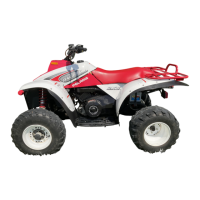
Do you have a question about the Polaris TRAIL BOSS 325 2001 and is the answer not in the manual?
| Brand | Polaris |
|---|---|
| Model | TRAIL BOSS 325 2001 |
| Category | Offroad Vehicle |
| Language | English |
Details on identifying the machine model number for service and warranty.
Information on where to find the serial number for service and warranty.
Provides the overall physical dimensions of the machine.
Lists key technical specifications of the machine.
Lists various publication numbers for reference.
Details the paint codes used for different parts of the machine.
Information on how to obtain replacement keys.
General torque specifications for fasteners used on the machine.
Chart providing decimal equivalents for fractional measurements.
Table of tap drill sizes for SAE threads.
Definitions of technical terms used in the manual.
Overview of periodic maintenance tasks and intervals.
Detailed list of daily checks for vehicle safety and operation.
Quick reference guide for recommended lubricants.
Procedures and guidelines for lubricating vehicle components.
Procedures for lubricating the transmission.
How to adjust the choke (enricher) control.
Procedure for adjusting the engine idle speed.
Adjusting throttle cable freeplay and the ETC switch.
Information and procedures related to the fuel system.
Procedure for testing engine compression.
Guidelines for maintaining the vehicle battery.
Procedures for spark plug inspection, gapping, and replacement.
Service procedures for pre-filters and air filters.
Procedures for draining and maintaining the recoil housing.
How to check the engine oil level.
Step-by-step guide for changing engine oil and filter.
Procedures for checking and adjusting valve clearance.
Adjusting steering and wheel alignment.
Using a straightedge or string to measure toe alignment.
Using chalk marks to measure toe alignment.
Recommended checks for the brake system's operating condition.
Inspecting drive chains and sprockets for wear and damage.
Procedure for adjusting drive chain tension on a concentric swingarm.
Adjusting suspension spring preload based on operator and load.
Inspecting wheels for runout or damage and checking nut tightness.
Recommended tire pressures for front and rear tires.
Lists torque specifications for various engine fasteners.
Outlines torque patterns for cylinder head, base, and crankcase fasteners.
Information on identifying pistons and rings, including directional marks.
Detailed service data and measurements for the engine.
Detailed steps for removing the engine from the frame.
Important notes and checklist for engine installation.
Guidance on selecting and using a cylinder hone.
Specifications for engine oil type, capacity, filter, and drain plug torque.
Description of how oil circulates through the ES32PF engine.
Exploded views of the ES32PFE engine components.
Steps for removing the cam chain tensioner.
How to inspect the cam chain tensioner for wear and proper function.
Inspecting rocker arms and shafts for wear and damage.
Steps for removing the camshaft from the engine.
Procedures for removing and inspecting the automatic compression release.
Inspecting camshaft lobes, journals, and oil clearance.
Steps for removing the cylinder head from the engine.
Measuring and checking cylinder head warpage.
Procedures for disassembling the cylinder head.
Inspecting valves for wear, damage, and measuring stem diameter.
Cleaning carbon deposits from the combustion chamber.
Guidance on reconditioning valve seats and cylinder heads.
Procedures for disassembling the engine's bottom end.
Procedures for removing the piston from the connecting rod.
Inspecting cylinder sealing surfaces, warpage, wear, taper, and roundness.
Inspecting piston outside diameter and clearance.
Proper installation of piston rings, including gap orientation.
Steps for installing the piston, pin, and circlips into the cylinder.
Procedures for installing the cylinder onto the crankcase.
Steps for installing the cylinder head onto the cylinder.
Procedures for installing the cam chain and camshaft, including timing.
Instructions for camshaft timing using Method 1.
Visual guide for camshaft timing with the stator removed.
Instructions for camshaft timing using Method 2.
Visual guide for camshaft timing using the flywheel TDC mark.
Installing the cam chain tensioner body.
Procedures for installing the stator plate.
Steps for installing the flywheel, washer, and nut.
Information on the starter drive mechanism.
Assembling the rocker shaft and rocker arms into the rocker cover.
Procedures for disassembling and inspecting the recoil starter mechanism.
Instructions for assembling the recoil starter mechanism.
Common causes and solutions for spark plug fouling.
General troubleshooting guide for engine problems.
Explanation of how altitude and temperature affect jetting.
Guidelines for adjusting the pilot screw for altitude and temperature.
Important guidelines for selecting the correct main jet.
Exploded view and component identification of the fuel tank assembly.
Diagram illustrating the fuel flow path.
Lists part numbers for Mikuni main and pilot jets.
Explanation of how each system within the CV carburetor functions.
Explanation of the mechanical operation of the Mikuni CV carburetor.
Function of the pilot system for idle and low-speed operation.
Operation of the starter system (choke or enrichment).
Function of the float system in maintaining fuel level.
Function of the main system in supplying fuel at mid-range and high throttle.
Detailed exploded view of the Mikuni BST 31 carburetor with part numbers.
Steps for disassembling the CV carburetor.
Procedures for cleaning carburetor components using cleaners.
Inspecting the jet needle, needle jet, and inlet needle for wear.
Steps for assembling the carburetor, including diaphragm and pilot screw.
Procedure for adjusting the float height on the carburetor.
Information about the fuel pump and testing procedures.
Steps for disassembling the fuel pump.
Inspecting and assembling the fuel pump components.
Troubleshooting guide for fuel system and carburetor issues.
Lists torque specifications and special tools for body and steering.
Exploded view illustrating the assembly of the vehicle body.
Step-by-step instructions for removing various covers and panels.
Exploded view of the steering assembly with torque values.
Detailed steps for replacing the A-arm assembly.
Procedures for removing and disassembling the concentric swingarm.
Steps for assembling and installing the concentric swingarm.
Exploded view of the strut assembly.
Procedures for replacing the front strut weldment.
Procedure for replacing the front strut ball joint.
Instructions for assembling the steering post and checking steering movement.
Lists required service tools and supplies for clutch work.
Overview of the Polaris Variable Transmission (PVT) system.
Periodic inspection and maintenance required for PVT system peak performance.
Steps for disassembling the PVT system, including drive clutch removal.
Procedures for assembling the PVT system, including covers and clutches.
Explanation of how the drive and driven clutches operate.
Specifications and chart for drive clutch springs, including free length.
Identification and information about different shift weights used in the PVT system.
How to inspect shift weights and their related components for wear.
Inspecting spider button to tower clearance and sheave surfaces.
Exploded view of the drive clutch assembly.
Steps for disassembling the drive clutch, including cover and bushing inspection.
Procedure for removing the spider from the drive clutch.
Inspecting the Teflon coating on the moveable sheave bushing.
Inspecting clutch rollers, pins, and thrust washers for wear and damage.
Steps for reassembling the drive clutch, including spider, sheave, and weights.
How to measure and adjust drive belt deflection (tension).
Procedures for removing and inspecting the drive belt for wear.
Steps for properly installing the drive belt.
Procedures for aligning the drive and driven clutches.
How to adjust clutch offset using spacer washers.
Lists tools and part numbers for drive clutch bushing service.
Steps for removing the bushing from the drive clutch moveable sheave.
Procedures for disassembling and inspecting the driven clutch.
Inspecting the Teflon coating on the moveable sheave bushing of the driven clutch.
Steps for assembling the driven clutch, including spring and helix installation.
Procedures for removing the bushing from the driven clutch moveable sheave.
Troubleshooting guide for clutch and PVT system issues.
Torque specifications for final drive components.
Procedures for disassembling and inspecting the front hub bearings.
Steps for assembling the front hub with bearings, spacer, and seal.
Procedures for installing the front hub onto the spindle.
Exploded view of the front hub assembly with torque values.
Steps for removing the rear axle assembly.
Procedures for disassembling the concentric swingarm rear axle.
Steps for assembling the concentric swingarm rear axle.
Procedures for installing the concentric swingarm rear axle assembly.
Exploded view of the concentric swingarm rear axle assembly.
Steps for removing the concentric swingarm rear housing.
Procedures for disassembling and servicing rear housing bearings.
Steps for assembling the rear housing and servicing bearings.
Procedures for installing the concentric swingarm rear housing.
Torque specifications for transmission components.
Steps for removing the transmission from the vehicle frame.
Procedures for installing the transmission, including clutch alignment.
Steps for disassembling the transmission.
Assembling the input shaft, output shaft, and gears into the transmission case.
Exploded view of the transmission components.
Checklist of items to check for shifting difficulties.
Brake system specifications and torque values.
Important reminders for brake system service.
Identifying causes and remedies for brake noise.
Explanation of how the hydraulic brake system functions.
Procedure for bleeding dual hydraulic calipers for hand and foot brakes.
Steps for replacing and bleeding brake fluid.
Steps for removing the master cylinder from the handlebars.
Procedures for disassembling the master cylinder.
How to inspect the master cylinder for wear or damage.
Steps for assembling the master cylinder with new seals and tools.
Procedures for installing the master cylinder and bleeding the system.
Steps for removing the front brake pads.
Procedures for installing front brake pads and caliper.
Inspecting the front brake disc for thickness, variance, and runout.
Procedures for removing and replacing the front brake disc.
Steps for removing the front brake caliper.
Procedures for disassembling the front brake caliper.
Inspecting the caliper body and piston for wear or damage.
Steps for assembling the front brake caliper.
Procedures for installing the front brake caliper and bleeding the system.
Exploded view of the front brake caliper components.
Steps for removing the rear brake pads.
Procedures for installing rear brake pads and caliper.
Steps for removing and inspecting the rear brake caliper.
Steps for assembling the rear brake caliper.
Inspecting the rear brake disc for thickness, variance, and runout.
Exploded view of the rear axle mounted caliper and master cylinder components.
Troubleshooting guide for brake system issues.
Lists specialized tools for electrical system diagnosis.
Important notes for diagnosing electrical problems.
Procedure for adjusting the high beam headlight aim.
Steps for replacing headlight bulbs and panels.
Procedure for replacing taillight and brakelight bulbs.
Steps for replacing indicator lamps.
Steps for checking the ignition timing.
How to adjust the stator plate position to set ignition timing.
Graph showing the typical ignition timing curve for the engine.
How to identify the flywheel using stamp marks.
Diagram and identification of alternator system components.
Troubleshooting steps for no or intermittent spark issues.
Testing component output using a peak reading voltmeter.
Testing CDI output to the ignition coil using a peak reading adaptor.
Comprehensive troubleshooting for ignition system faults causing no or weak spark.
Steps for performing initial service on a new battery.
Procedures for inspecting battery fluid level and removing the battery.
Steps for installing the battery, including cable connections and vent tube.
Overview of battery condition tests: OCV, Specific Gravity, Load Test.
Using a hydrometer to measure electrolyte specific gravity for state of charge.
Performing a load test on the battery to check its capacity.
Basic battery maintenance procedures for extended non-use.
Step-by-step system check for charging system problems.
Testing for electrical current draw with the key off.
Performing the "Break Even" test to determine charging system performance.
Testing the AC amperage output from the alternator.
Troubleshooting common starter system issues like no turn or slow turn.
Performing voltage drop tests to identify bad connections in the starter system.
Steps for disassembling the starter motor.
Inspecting and replacing starter motor brushes.
Testing the starter motor armature for resistance and shorts.
Procedures for assembling the starter motor.
Replacement of the garter spring in the starter drive.
Specifications for limiter modules, including reverse limit RPM.
Wiring diagram and function of the reverse speed limit system.
Troubleshooting flowchart for the reverse speed limit system.
Explanation of thermistor resistance vs. temperature and fan control.
Testing the thermistor and LR60 fan control circuit.
Performing a current draw test on the fan motor.
Switch continuity table and schematic for testing the gear position indicator.
Explanation of the ETC system's purpose and switch operation.
Testing the ETC switch for proper function.
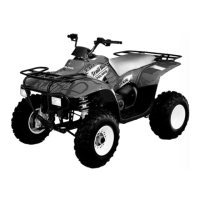
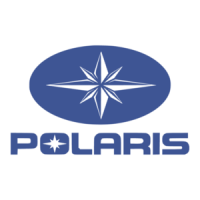
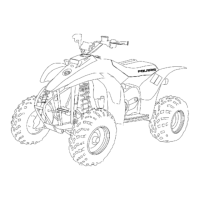


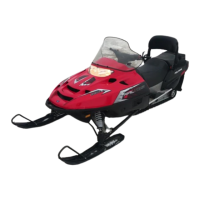
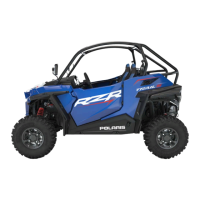




